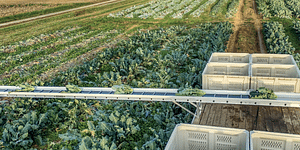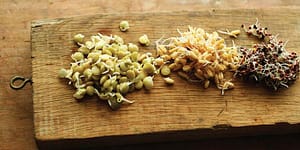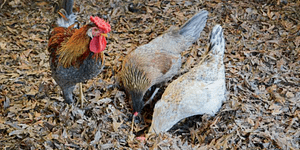How Loving Labor Leads to a Brighter Future: Sourcing a Solution

Drawing on a vast range of sources from across a multitude of disciplines, A Small Farm Future analyses the complex forces that make societal change inevitable; explains how low-carbon, locally self-reliant agrarian communities and loving labor can empower us to successfully confront these changes head on; and explores the pathways for delivering this vision politically.
Challenging both conventional wisdom and utopian blueprints, this book offers rigorous original analysis of wicked problems and hidden opportunities in a way that illuminates the path toward functional local economies, effective self-provisioning, agricultural diversity and a shared earth.
This excerpt is from A Small Farm Future by Chris Smaje and has been adapted for the web.
The palm civet is a small omnivorous mammal of Indonesia and other parts of tropical Asia. Emerging from its forest home 
In the 1990s, Indonesian kopi luwak – civet coffee, made from coffee beans that had passed through a civet’s digestive tract – became a new luxury commodity among wealthy coffee-lovers. Market dynamics being what they are, local producers cashed in on the demand by capturing and caging wild civets, force-feeding them coffee beans and selling the produce as cut-price kopi luwak. Though cheaper, the resulting coffee lacked the quality of the original conferred by the civet’s discerning nose, and came at the expense of ecological and animal welfare.1
We live in a world of trade-offs.
If you want genuine kopi luwak of good quality and low environmental impact you have to pay someone to comb through the forests looking for wild civet scat on your behalf. Humans can simulate the process and produce a similar product at lower cost, but it’s not the same.
It may sometimes be possible to find genuine trade-off free, win-win improvements. But with most things, including kopi luwak, and with agriculture in general, there are trade-offs. Improve on price and you lower animal welfare. Increase the yield and you also increase human labour, fossil fuels, or downstream pollution. And so on. Whether the cost of an improvement is worth its price is a value judgement that different people will weigh differently. But not everyone’s voice is heard, especially when the costs are offloaded onto the future.
In our bid to provide cheap food to our human multitudes, the trade-off is that a lot of people end up eating shit – figuratively and, as we’ve just seen, sometimes literally. But our culture is drawn to a narrative of constant progress – a narrative that compels us to avert our attention from this possibility raised by the economist Thomas Sowell: there are no ‘solutions,’ only trade-offs.2
There are different ways of dealing with troublesome trade-offs or, in the words of futurologist Peter Frase,3 of ‘loving our monsters’. If human actions are driving pollinators to extinction, Frase suggests we ‘deepen our engagement with nature’ by developing robotic pseudo-bees to do the job instead. I won’t dwell here on how fanciful that is, but I will suggest a wholly different ‘monster’ we could choose to love if we so wished: an agriculture that doesn’t use poisons that kill bees, and instead favours more complex biological interventions, including more human labour. We could learn to love the immediate work in acting on the natural world as much as the mediated work of developing machines to do it.
And we could also love the limits to action imposed by nature as much as we love to transcend them.
An obstacle to that kind of love is the narrative of progress I mentioned. Adopting low-tech, labour-intensive approaches to solving a problem or meeting a need, rather than high-tech, labour-substituting approaches is considered regressive, a nostalgic turning back of the clock, as if a historical ratchet prevents us from doing anything in the future that looks like things we did in the past. Actually, there is a ratchet that works like this – the capitalist political economy. The mistake we often make is to suppose that this ratchet is some implacable force of nature rather than just a particular way of organising society, itself with a history that may someday end.
These two monsters of overcoming versus restraint are becoming as significant a divide in contemporary politics as old schisms between right and left. Thomas Sowell distinguished between what he called ‘constrained’ and ‘unconstrained’ visions of human well-being, the former emphasising the optimization of trade-offs within relatively immobile constraints, the latter emphasising perfectibility through the overcoming of constraints. The former is usually associated, like Sowell himself, with conservative thought. It encompasses a popular notion of capitalism as market exchange, the sum of innumerable transactions with no higher purpose or guiding hand emerging from the bounded rationality of people acting in their own immediate here and now. The unconstrained vision has usually been associated with the political left and its ideas of remoulding people to work collectively, achieving new goals and great things.
But these certainties are now dissolving. The neoliberal turn in global capitalism invests the hive mind of ‘the market’ itself with a kind of limit-busting, self-perfecting intelligence that brooks no opposition to any constraints human reason tries to put around it. And various strands of unconstrained leftism sign themselves up to this programme, becoming almost indistinguishable from the capitalism they supposedly reject. Witness books with titles like Fully Automated Luxury Communism or The People’s Republic of Walmart: How the World’s Biggest Corporations Are Laying the Foundation for Socialism.4

For these reasons, we need to consider some questions that modern political traditions have scarcely equipped us to answer with subtlety, or even to ask. What if the route out of widespread farming towards urban-industrial prosperity that today’s rich countries followed is no longer feasible for millions of poor people in ‘developing’ countries? What if that urban-industrial life in fact becomes increasingly unfeasible even in the rich countries in the face of various political, economic and ecological crises? How might the future of humanity then unfold?
- Wild, Tony (2014) ‘Can World’s Most Expensive Brew Be Made Sustainably?’ The Guardian, 19 September. My thanks to Paul Hillman for drawing this example to my attention.
- Sowell 2006.
- Frase 2016, 101.
- Bastani 2019; Phillips and Rozworski 2019.
Recommended Reads
Recent Articles
Oxeye daisies are one of the most important plants for pollinators including beetles, ants, and moths that use oxeye daisies as a source of pollen and nectar. Instead of thinking about removing a plant like oxeye daisy, consider how you can improve the fertility and diversity of habitat resources in your home landscape, garden, or…
Read MoreSo you want to start reaping your harvest, but you’re not sure where to start? Learn how to break down the options of harvesting tools!
Read MoreWhat’s so great about oyster mushrooms? First, you can add them to the list of foods that can be grown indoors! They are tasty, easy to grow, multiply fast, and they love a variety of substrates, making oyster mushrooms the premium choice. The following is an excerpt from Fresh Food from Small Spaces by R. J.…
Read MoreEver heard the phrase, “always follow your nose?” As it turns out, this is a good rule of thumb when it comes to chicken manure. Composting chicken manure in deep litter helps build better chicken health, reduce labor, and retain most of the nutrients for your garden. The following is an excerpt from The Small-Scale Poultry…
Read More








